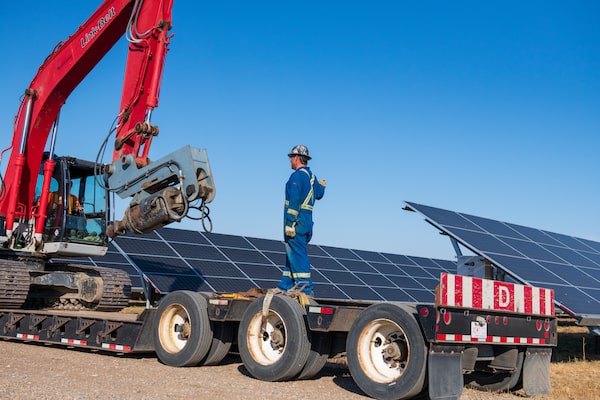
Construction workers install solar panels at the Enbridge Alberta Solar One project, in County of Forty Mile, near the hamlet of Burdett, Alta., on Oct. 4, 2022.Guillaume Nolet/The Globe and Mail
Rick Christiaanse is the chief executive of Invest Alberta, which works directly with investors to help them start up or scale up in Alberta.
Alberta has long been seen as the cowboy-boot-wearing, oil-and-gas-touting cousin at the family reunion. While we’re proud of our energy legacy and can certainly rock a Stetson, the narrative needs a reboot.
It’s time the country realized that Alberta is more than just a rodeo – it’s a global clean-energy leader, and we’ve got the investors, innovations and international recognition to prove it.
In the Canadian consciousness, Alberta has been perceived through the lens of its traditional role as an energy powerhouse, fuelled by oil and gas. While this has undeniably shaped the province, the perception among Canadians has failed to keep pace with Alberta’s dynamic evolution, particularly in the realm of clean energy.
Despite increasing diplomatic challenges at the federal level, Alberta has managed to forge meaningful partnerships with major investors from Asia, the United States and elsewhere around the world. The province is swiftly becoming a hub for clean-energy initiatives, attracting substantial investments and partnerships from Fortune 500 companies including Amazon AMZN-Q, Posco Holdings PKX-N, Itochu Corp. and Sumitomo Corp.
Last year, Alberta led Canada in renewable energy growth, accounting for 77 per cent of the 1.8 gigawatts of solar and wind generation capacity that came online that year. Amazon recently announced plans to invest in its first wind farm project in Canada in southern Alberta, which follows the recent opening of Amazon’s Travers solar project in Alberta, one of the largest solar farms in North America.
With opportunities on that scale, Alberta remains a premier destination for renewable energy projects, even while the province has temporarily paused new approvals.
Certainly, Alberta’s pause raises eyebrows as the province grapples with the delicate balance between growth and responsible development. Viewing the pause through the lens of outdated stereotypes, with the narrative that Alberta is hindering action toward achieving net zero, ignores the challenges Alberta is navigating to transition to cleaner energy sources while maintaining the economic growth crucial for the entire country.
Sumitomo, a leading Japanese trading and business investment company, has identified climate-change mitigation as a key focus and shares Alberta’s target of achieving carbon neutrality by 2050. Alberta’s commitment to creating an optimal environment for businesses focused on transitioning to a carbon-neutral society led Sumitomo to choose the province.
The company has already secured exclusive rights to significant equity in the Reconciliation Energy Transition Inc (RETI) Hub, a proposed carbon-sequestration and transportation-development project set to expand CO2 storage to an impressive three million tonnes annually.
Itochu, another Japanese trading house, is also actively engaged in cleantech and emissions-reduction projects in Alberta. Exploring the development of world-scale integrated blue-ammonia and blue-methanol production facilities in Alberta’s Industrial Heartland, Itochu showcases the province’s appeal as a destination for innovative ventures.
Alberta’s global leadership in responsible development extends beyond energy. With 29 of the 31 critical minerals essential for electric-vehicle batteries, Alberta is poised to play a pivotal role in the global EV revolution.
A new partnership with Posco Holdings, the Korean steel giant whose expertise is now being applied to lithium exploration and development, represents an endorsement by a major player of the potential that exists for Alberta to develop into a global critical-mineral supplier.
As global supply chain strategies evolve to prioritize political stability and resilience, multinational companies are recognizing Alberta as a strategic location for investment to support their climate-related sustainability goals. This stimulates job creation, economic growth and continuing development that is good for Canadians.
Since 2020, Invest Alberta has attracted a staggering $20-billion in investments, creating more than 27,000 jobs. These investments span across energy, agriculture, technology, aviation and more, many with strong links to research and development through partnerships with postsecondary institutions.
It’s essential for Canadians to recognize that Alberta’s prosperity translates into opportunities for the entire country.
It became clear while attending COP28 in Dubai that many companies and countries recognize Alberta’s advantages better than our provincial neighbours. We need Canadians, especially those involved in economic development and investment attraction, to shake off dusty, outdated ideas about Alberta.
Continuing misunderstanding risks compromising Alberta’s global competitiveness and ability to attract investments, talent and partnerships needed for national economic growth.